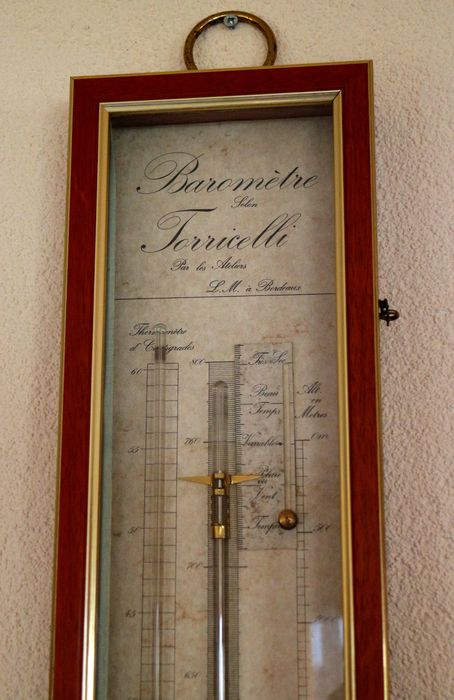[Greek] βάρος (baros), [Latin] pondus: heaviness, pressure, burden authority, weight, power, load; Mt.20:12, 1Thess.2:6, Rev.2:24, 2Cor.4:17, Acts 15:28, Gal.6:2

The barometer was invented by Evangelista Torricelli (1627-1691)
Background Information:
Greek Hellenism: This term, essentially meaning bodily weight, conveys the sense of suffering, pressure, fullness, and power. The physical sense can refer to the weight of the elements, man, animals, pregnancy, scales, freight, and supplies. In a metaphorical sense, this refers to stressing words or syllables. The sense of pressure (active movement) can refer to hail damage, ships, troops, and elephants. The sense of fullness can refer to riches, well-being, and maturity. The sense of suffering can refer to physical afflictions, soul (spiritual afflictions), oppression, and misery. The sense of power can refer to political authority, army strength, dignity, and appearance.
Examples of baros: Philo’s Joseph 140 states “human affairs are weighed on a scale.” Polybius’ Histories 1,39,4 states “their ship went aground.” Philo’s Moses 119 states “the weight of the hail.” Sophocles’ Oedipus at Colunus states “someday this will be a grief for Cadmeans.” Sophocles’ Trachinae 325 states “she has been constantly laboring under the heavy pains of her misfortune and weeping.” Plutarch’s Pericles 37 states “no one (generals and counselors) appeared to have the weight that was adequate or authority that was competent for such leadership.”
Old Testament: This term, used quite frequently in the Old Testament, means glory, honor, dignity, reverence, and abundance. Scriptural examples of glory and honor occur quite extensively. In other contexts, this term can refer to army supplies and troop movements. The sense of burdens refer to affliction and spiritual suffering. Affliction and suffering will continue to later play an important role in the New Testament.
Neither the high mountains nor the valleys and hills can support the mass of them (Jdt.7:4). And now no one could endure the transport of man because of this intolerable stench (2Macc.9:10). They placed their little ones, their livestock, and their goods at the head of the column (Jdg.18:21). Then you shall see the glory of the Lord (Exo.16:7). Chastised a little, they shall be greatly blessed, because God found them worthy of Himself (Wis.3:5). Therefore those who gave over their bodies in suffering for the sake of religion were not only admired by mortals, but also were deemed worthy to share in a divine inheritance (4Macc.18:3).
New Testament: This term means burden, hardship, and weight. Interestingly, in contrast to the Old Testament, the sense of burden is more prominently illustrated. The meaning of this term changes because of the early Christian attitudes toward suffering, persecution, and the yoke of the Law. Christians are expected to face and endure struggles. Those who suffer for the sake of Christ receive grace (or blessings) in an eschatological sense. Christ calls upon His followers to bear another’s burdens in helping and serving others. These followers fulfill the law of Christ. The apostles impose their weight (authority) on the people like a mother cares for her children. Jesus offers a lighter burden as opposed to the yoke of the Law.
Scripture:
“Bear one another’s burdens, and so you will fulfill the law of Christ.” Gal.6:2
Christ calls upon each one of us to serve other, even to point of laying down one’s life for another.
“Although we were able to impose our weight as apostles of Christ. Rather, we were gentle among you, as a nursing mother cares for her children.” 1Thess.2:7
The apostles, through their authority, gently lead their followers.
“For this momentary light affliction is producing for us and eternal weight of glory beyond all comparison.” 2Cor.4:17
Christian suffering does not become meaningless. Those who suffer for following Christ will receive a grace or eternal reward. This is relates to accumulating spiritual treasures in heaven.
Conclusion:
Barometer, barometric, isobar, pound
I discovered that this term has a rich backstory throughout history. In addition to its physical sense, this term also has a figurative, metaphorical, and psychological sense. It interesting to see how burdens and pressures become related. No doubt even in ancient times, man experienced struggles (pressures) both in an emotional, psychological, and spiritual sense. The barometer, in the conventional sense, (measuring atmospheric pressure) had not been conceived as of yet.
I was not really surprised that this term extensively conveyed honor or glory in the Old Testament culture. Perhaps this is due to its monotheistic culture. However, it is interesting to note that Wis. 3:5 begins to shed some light about how some afflictions can lead to great blessings. This idea becomes very important for the Christians in the New Testament.
In the New Testament, the central meaning of this term means burden. Perhaps it is due to the introduction of Jesus, although like God, who can relate to man. Christian struggles, for the sake of Jesus, find meaning for the Christian. Christian suffering takes on a salvific dimension, often becoming a grace. This illustrates the Catholic understanding of redemptive suffering. Some are called to share in the suffering of Christ.
The barometer was first developed in 1643. This term was first coined by English scientist Robert Boyle (1627-1691).
In more recent times, social media just adds another level of complexity pertaining to sociological burdens and pressures. These aspects can both be beneficial and detrimental, depending on the context.
It was very interesting how this term is “stressed” over time.—Sorry—couldn’t resist (the pressure).
